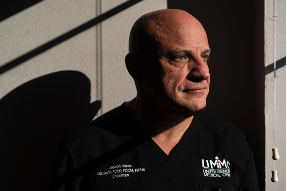Probiotics as prevention for gastro-intestinal disorders in pediatrics
Abstract
This is a narrative review of largely randomized trials on the impacts of probiotics. It concludes that evidence for beneficial effects of selected probiotics in the prevention of gastrointestinal disorders is limited mainly to acute gastroenteritis, antibiotic-associated diarrhea, infantile colic and necrotizing enterocolitis. However, there is no broad consensus to recommend the use of probiotics in the prevention of these conditions, mainly because of the different designs used in different studies, resulting in limited evidence for specific strains, dosages and indications. More well-designed studies utilizing standardized methodologies are needed before recommendations can be proposed. At this stage, there is insufficient evidence to recommend the routine use of probiotics in infants and children for the prevention of gastro-intestinal disordersDownloads
References
Cani PD. Human gut microbiome: hopes, threats and promises. Gut. 2018 Sep 1;67(9):1716-25.
Lo Vecchio A, Vandenplas Y, Benninga M, Broekaert I, Falconer J, Gottrand F, Lifschitz C, Lionetti P, Orel R, Papadopoulou A, Ribes‐Koninckx C. An international consensus report on a new algorithm for the management of infant diarrhoea. Acta Paediatrica. 2016 Aug;105(8):e384-9.
Hill C, Guarner F, Reid G, Gibson GR, Merenstein DJ, Pot B, Morelli L, Canani RB, Flint HJ, Salminen S, Calder PC. The International Scientific Association for Probiotics and Prebiotics consensus statement on the scope and appropriate use of the term probiotic. Nat Rev Gastroenterol Hepatol. 2014 Jun 10;11(8):506-14.
Van den Akker CH, van Goudoever JB, Szajewska H, Embleton ND, Hojsak I, Reid D, Shamir R. ESPGHAN Working Group for Probiotics, Prebiotics & Committee on NutritionProbiotics for preterm infants: a strain specific systematic review and network meta-analysis. J Pediatr Gastroenterol Nutr. 2018 Jul;67(1):103-22.
Pell LG, Loutet MG, Roth DE, Sherman PM. Arguments against routine administration of probiotics for NEC prevention. Current opinion in pediatrics. 2019 Apr 1;31(2):195-201.
Sanders ME, Benson A, Lebeer S, Merenstein DJ, Klaenhammer TR. Shared mechanisms among probiotic taxa: implications for general probiotic claims. Current opinion in biotechnology. 2018 Feb 1;49:207-16.
Chouraqui JP, Van Egroo LD, Fichot MC. Acidified milk formula supplemented with Bifidobacterium lactis: impact on infant diarrhea in residential care settings. Journal of pediatric gastroenterology and nutrition. 2004 Mar 1;38(3):288-92.
Hojsak I, Pavić AM, Kos T, Dumančić J, Kolaček S. Bifidobacterium animalis subsp. lactis in prevention of common infections in healthy children attending day care centers–randomized, double blind, placebo-controlled study. Clinical Nutrition. 2016 Jun 1;35(3):587-91.
Sazawal S, Dhingra U, Hiremath G, Sarkar A, Dhingra P, Dutta A, Verma P, Menon VP, Black RE. Prebiotic and probiotic fortified milk in prevention of morbidities among children: community-based, randomized, double-blind, controlled trial. PLoS One. 2010 Aug 13;5(8):e12164.
Laursen RP, Larnkjær A, Ritz C (2017). Probiotics and child care absence due to infections: a randomized controlled trial. Pediatrics140:pii:e2017073. Laursen RP, Larnkjær A, Ritz C, Hauger H, Michaelsen KF, Mølgaard C. Probiotics and child care absence due to infections: a randomized controlled trial. Pediatrics. 2017 Aug 1;140(2):e20170735.
Bocquet A, Lachambre E, Kempf C, Beck L. Effect of infant and follow-on formulas containing B lactis and galacto-and fructo-oligosaccharides on infection in healthy term infants. Journal of pediatric gastroenterology and nutrition. 2013 Aug 1;57(2):180-7.
Oberhelman RA, Gilman RH, Sheen P, Taylor DN, Black RE, Cabrera L, Lescano AG, Meza R, Madico G. A placebo-controlled trial of Lactobacillus GG to prevent diarrhea in undernourished Peruvian children. The Journal of pediatrics. 1999 Jan 1;134(1):15-20.
Schneider C, Illi M, Lötscher M, Wehrli M, von Gunten S. Isolation of antibodies from human plasma, saliva, breast milk, and gastrointestinal fluid. InNatural Antibodies 2017 (pp. 23-31). Humana Press, New York, NY.
Freedman SB, Williamson-Urquhart S, Farion KJ, Gouin S, Willan AR, Poonai N, Hurley K, Sherman PM, Finkelstein Y, Lee BE, Pang XL. Multicenter trial of a combination probiotic for children with gastroenteritis. New England Journal of Medicine. 2018 Nov 22;379(21):2015-26.
Schnadower D, Tarr PI, Casper TC, Gorelick MH, Dean JM, O’connell KJ, Mahajan P, Levine AC, Bhatt SR, Roskind CG, Powell EC. Lactobacillus rhamnosus GG versus placebo for acute gastroenteritis in children. New England Journal of Medicine. 2018 Nov 22;379(21):2002-14.
Pedone CA, Arnaud CC, Postaire ER, Bouley CF, Reinert P. Multicentric study of the effect of milk fermented by Lactobacillus casei on the incidence of diarrhoea. International journal of clinical practice. 2000 Nov;54(9):568-71.
Weizman Z, Asli G, Alsheikh A (2005). Effect of a probiotic infant formula on infections in child care centers: comparison of two probiotic agents. Pediatrics. 115:5-9.
Gutierrez-Castrellon P, Lopez-Velazquez G, Diaz-Garcia L (2014). Diarrhea in preschool children and Lactobacillus reuteri: a randomized controlled trial. Pediatrics 133:e904–9.
Urbańska M, Szajewska H (2014). The efficacy of Lactobacillus reuteri DSM 17938 in infants and children: a review of the current evidence. Eur J Pediatr. 2173:1327–1337
Saavedra JM, Bauman NA, Oung I (1994). Feeding of Bifidobacterium bifidum and Streptococcus thermophilus to infants in hospital for prevention of diarrhoea and shedding of rotavirus. Lancet 344:1046–1049
Hojsak I, Tokić Pivac V, Močić Pavić A (2015). Bifidobacterium animalis subsp. lactis fails to prevent common infections in hospitalized children: a randomized, double-blind, placebo-controlled study. Am J Clin Nutr 101:680–684
Szajewska H, Kotowska M, Mrukowicz JZ (2001). Efficacy of Lactobacillus GG in prevention of nosocomial diarrhea in infants. J Pediatr 138:361–365.
Mastretta E, Longo P, Laccisaglia A, Balbo L (2002). Effect of Lactobacillus GG and breast-feeding in the prevention of rotavirus nosocomial infection. J Pediatr Gastroenterol Nutr 35:527–531
Bruzzese E, Fedele MC, Bruzzese D (2016). Randomised clinical trial: a Lactobacillus GG and micronutrient-containing mixture is effective in reducing nosocomial infections in children, vs. placebo. Aliment Pharmacol Ther 44:568–575.
Wanke M, Szajeweska H (2014). Probiotics for preventing healthcare-associated diarrhea in children: A meta-analysis of randomized controlled trials. Pediatr Pol 89:8–16.
Trivić I, Hojsak I (2018). Use of probiotics in the prevention of nosocomial infections. J Clin Gastroenterol 52 Suppl 1:S62–65.
Urbańska M, Gieruszczak-Białek D, Szymański H (2016). Effectiveness of Lactobacillus reuteri DSM 17938 for the prevention of nosocomial diarrhea in children: A randomized, double-blind, placebo-controlled trial. Pediatr Infect Dis J 35:142–145.
Wanke M, Szajewska H (2012). Lack of an effect of Lactobacillus reuteri DSM 17938 in preventing nosocomial diarrhea in children: a randomized, double-blind, placebo-controlled trial. J Pediatr 161:40–43.
Hojsak I, Szajewska H, Canani RB (2018). Probiotics for the Prevention of nosocomial diarrhea in children. J Pediatr Gastroenterol Nutr 66:3–9.
Cameron D, Hock QS, Kadim M (2017). Probiotics for gastrointestinal disorders: Proposed recommendations for children of the Asia-Pacific region. World J Gastroenterol 23:7952–796.4
Guandalini S (2011) Probiotics for prevention and treatment of diarrhea. J Clin Gastroenterol. 45:S149–153.
Fox MJ, Ahuja KD, Robertson IK (2015). Can probiotic yogurt prevent diarrhoea in children on antibiotics? A double-blind, randomised, placebo-controlled study. BMJ Open. 5:e006474.
Olek A, Woynarowski M, Ahrén IL (2017). Efficacy and safety of Lactobacillus plantarum DSM 9843 (LP299V) in the prevention of antibiotic-associated gastrointestinal symptoms in children-randomized, double-blind, placebo-controlled study. J Pediatr. 186:82–86.
Kołodziej M, Szajewska H (2018). Lactobacillus reuteri DSM 17938 in the prevention of antibiotic-associated diarrhoea in children: a randomized clinical trial. Clin Microbiol Infect. pii:S1198-743X(18)30591-3.
Shan LS, Hou P, Wang ZJ (2013). Prevention and treatment of diarrhoea with Saccharomyces boulardii in children with acute lower respiratory tract infections. Benef Microbes. 4:329–334.
Johnston BC, Goldenberg JZ, Parkin PC (2016). Probiotics and the prevention of antibiotic-associated diarrhea in infants and children. JAMA. 316:1484–1485.
Goldenberg JZ, Lytvyn L, Steurich J (2015). Probiotics for the prevention of pediatric antibiotic-associated diarrhea. Cochrane Database Syst Rev. 12:CD004827.
Szajewska H, Kołodziej M (2015) Systematic review with meta-analysis: Lactobacillus rhamnosus GG in the prevention of antibiotic-associated diarrhoea in children and adults. Aliment Pharmacol Ther. 42:1149–1157.
Goldenberg JZ, Mertz D, Johnston BC (2018). Probiotics to prevent Clostridium difficile infection in patients receiving antibiotics. JAMA. 320:499–500.
Szajewska H., Canani RB, Guarino A (2016). ESPGHAN Working Group for Probiotics and Prebiotics. Probiotics for the prevention of antibiotic-associated diarrhea in children. J Pediatr Gastroenterol Nutr. 62:495–506.
Mantegazza C, Molinari P, D'Auria E (2018). Probiotics and antibiotic-associated diarrhea in children: A review and new evidence on Lactobacillus rhamnosus GG during and after antibiotic treatment. Pharmacol Res. 128:63–72.
Guo Q, Goldenberg JZ, Humphrey C, El Dib R, Johnston BC (2019). Probiotics for the prevention of pediatric antibiotic-associated diarrhea. Cochrane Database Syst Rev. 4:CD004827.
Dinleyici M, Vandenplas Y (2019). Clostridium difficile colitis prevention and treatment Adv Exp Med Biol. 2019;1125:139-146. doi: 10.1007/5584_2018_322.
Vermeersch SJ, Vandenplas Y, Tanghe A (2018). Economic evaluation of S. boulardii CNCM I-745 for prevention of antibiotic associated diarrhoea in hospitalized patients. Acta Gastroenterol Belg. 81:269–276.
Sung V (2018) Infantile colic. Aust Prescr. 41:105–110.
Johnson JD, Cocker K, Chang E (2015). Infantile colic: recognition and treatment. Am Fam Physician. 92:577–582.
Sung V, D'Amico F, Cabana MD (2018). Lactobacillus reuteri to treat infant colic: a meta-analysis. Pediatrics. 141:e20171811.
Harb T, Matsuyama M, David M (2016). Infant colic-what works: a systematic review of interventions for breast-fed infants. J Pediatr Gastroenterol Nutr. 62:668-686.
Indrio F, Di Mauro A, Riezzo G (2014). Prophylactic use of a probiotic in the prevention of colic, regurgitation and functional constipation: a randomized clinical trial. JAMA Pediatr. 168:228–233.
Savino F, Ceratto S, Poggi E (2015). Preventive effects of oral probiotic on infantile colic: a prospective, randomised, blinded, controlled trial using Lactobacillus reuteri DSM 17938. Benef Microbes. 6:245–251.
Indrio F, Di Mauro A, Riezzo G (2015). Prevention of functional gastrointestinal disorders in neonates: clinical and socioeconomic impact. Benef Microbes. 6:195–198.
Cabana MD, McKean M, Beck AL (2019). Pilot analysis of early LGG for infant colic prevention. J Pediatr Gastroenterol Nutr 68:17–19.
Giglione E, Prodam F, Bellone S (2016). The association of bifidobacterium breve br03 and b632 is effective to prevent colics in bottle-fed infants: a pilot, controlled, randomized, and double-blind study. J Clin Gastroenterol. 50 Suppl 2:S164–S167.
Ong TG, Gordon M, Banks SS, Thomas MR, Akobeng AK (2019). Probiotics to prevent infantile colic. Cochrane Database Syst Rev. 3:CD012473.
Grave GD, Nelson SA, Walker WA (2007). New therapies and preventive approaches for necrotizing enterocolitis: report of a research planning workshop. Pediatr Res. 62:510–514.
Neu J, Walker WA (2011). Necrotizing enterocolitis. N Engl J Med. 20:255–264.
Claud EC, Walker WA (2001). Hypothesis: inappropriate colonization of the premature intestine can cause neonatal necrotizing enterocolitis. FASEB J. 15:1398–1403.
Morowitz MJ, Poroyko V, Caplan M (2010). Redefining the role of intestinal microbes in the pathogenesis of necrotizing enterocolitis. Pediatrics. 125:777–785.
Schwiertz A, Gruhl B, Löbnitz M (2003). Development of the intestinal bacterial composition in hospitalized preterm infants in comparison with breast-fed, full-term infants. Pediatr Res. 54:393–399.
Collado MC, Rautava S, Aakko J (2016). Human gut colonisation may be initiated in utero by distinct microbial communities in the placenta and amniotic fluid. Sci Rep. 6:23129.
Forsberg A, West CE, Prescott SL (2016). Pre-and probiotics for allergy prevention: time to revisit recommendations? Clin Exp Allergy 46:1506¬–1521
Zhu XL, Tang XG, Qu F (2019) l. Bifidobacterium may benefit the prevention of necrotizing enterocolitis in preterm infants: A systematic review and meta-analysis. Int J Surg. 61:17–25.
Heida FH, van Zoonen AG, Hulscher JB (2016). A necrotizing enterocolitis-associated gut microbiota is present in the meconium: results of a prospective study. Clin Infect Dis. 62:863–870.
Kane AF, Bhatia AD, Denning PW (2018). Routine supplementation of Lactobacillus rhamnosus GG and risk of necrotizing enterocolitis in very low birth weight infants. J Pediatr. 195:73–79.
Patel S, Chaudhari M, Kadam S (2018). Standardized feeding and probiotic supplementation for reducing necrotizing enterocolitis in preterm infants in a resource limited set up. Eur J Clin Nutr. 72:281–287.
Escribano E, Zozaya C, Madero R (2018). Increased incidence of necrotizing enterocolitis associated with routine administration of Infloran™ in extremely preterm infants. Benef Microbes. 9:683–690
Vandenplas Y, Hauser B, Salvatore S (2019). Functional gastrointestinal disorders in infancy: impact on the health of the infant and family. Pediatr Gastroenterol Hepatol Nutr. 22:207-216.
Salvatore S, Abkari A, Cai W, Catto-Smith A, Cruchet S, Gottrand F, Hegar B, Lifschitz C, Ludwig T, Shah N, Staiano A, Szajewska H1 Treepongkaruna S, Vandenplas Y (2018). Review shows that parental reassurance and nutritional advice help to optimise the management of functional gastrointestinal disorders in infants. Acta Paediatr. 2018 107:1512–1520
Garofoli F, Civardi E, Indrio F (2014). The early administration of Lactobacillus reuteri DSM 17938 controls regurgitation episodes in full-term breastfed infants. Int J Food Sci Nutr. 65:646–648.
Indrio F, Riezzo G, Raimondi F (2011). Lactobacillus reuteri accelerates gastric emptying and improves regurgitation in infants. Eur J Clin Invest. 41:417–422.
Vandenplas Y, Analitis A, Tziouvara C (2017). Safety of a new synbiotic starter formula. Pediatr Gastroenterol Hepatol Nutr. 20:167–177.
Belei O, Olariu L, Dobrescu A (2018). Is it useful to administer probiotics together with proton pump inhibitors in children with gastroesophageal reflux? J Neurogastroenterol Motil. 24:51–57.
Koppen IJ, Benninga MA, Tabbers MM (2016). Is there a role for pre-, pro- and synbiotics in the treatment of functional constipation in children? A systematic review. J Pediatr Gastroenterol Nutr. 63 Suppl 1:S27–35.
Huang R, Hu J (2017). Positive effect of probiotics on constipation in children: a systematic review and meta-analysis of six randomized controlled trials. Front Cell Infect Microbiol. 7:153.
Fang HR, Zhang GQ, Cheng JY, Li ZY (2019). Efficacy of Lactobacillus-supplemented triple therapy for Helicobacter pylori infection in children: a meta-analysis of randomized controlled trials. Eur J Pediatr. 178:7–16.
Szajewska H, Horvath A, Kołodziej M (2015). Systematic review with meta-analysis: Saccharomyces boulardii supplementation and eradication of Helicobacter pylori infection. Aliment Pharmacol Ther. 41:1237–1245.
Gabrielli M, Lauritano EC, Scarpellini E, Lupascu A, Ojetti V, Gasbarrini G, Silveri NG, Gasbarrini A (2009). Bacillus clausii as a treatment of small intestinal bacterial overgrowth. Am J Gastroenterol. 104:1327-1328.
Hegar B, Hutapea EI, Advani N (2013). A double-blind placebo-controlled randomized trial on probiotics in small bowel bacterial overgrowth in children treated with omeprazole. J Pediatr (Rio J). 89:381–387.
Wegh CAM, Benninga MA, Tabbers MM (2018). Effectiveness of probiotics in children with functional abdominal pain disorders and functional constipation: a systematic review. J Clin Gastroenterol. 52 Suppl 1:S10–S26.
Guandalini S, Magazzù G, Chiaro A (2010). VSL#3 improves symptoms in children with irritable bowel syndrome: a multicenter, randomized, placebo-controlled, double-blind, crossover study. J Pediatr Gastroenterol Nutr. 51:24–30.
Submitted
World Nutrition Journal provides immediate open access to its content under the Creative Commons Attribution License (CC BY 4.0). This permits unrestricted use, distribution, and reproduction in any medium, provided the original work is properly cited.













